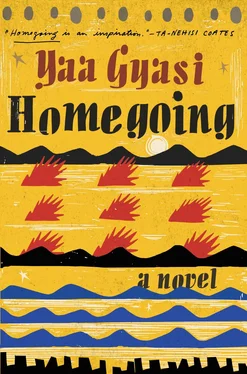“Yes, Old Lady,” she said.
Her grandmother took her hand and once more they fell silent. “You are in this water,” she finally said.
Marjorie nodded her head soberly. The day she was born, thirteen years ago, all the way across the Atlantic, her parents had mailed her umbilical cord to Old Lady so that the woman could put it into the ocean. It was Old Lady’s only request, that if her son and daughter-in-law, both old themselves by the time they decided to get married and move to America, ever had a child they would send something of that child back to Ghana.
“Our family began here, in Cape Coast,” Old Lady said. She pointed to the Cape Coast Castle. “In my dreams I kept seeing this castle, but I did not know why. One day, I came to these waters and I could feel the spirits of our ancestors calling to me. Some were free, and they spoke to me from the sand, but some others were trapped deep, deep, deep in the water so that I had to wade out to hear their voices. I waded out so far, the water almost took me down to meet those spirits that were trapped so deep in the sea that they would never be free. When they were living they had not known where they came from, and so dead, they did not know how to get to dry land. I put you in here so that if your spirit ever wandered, you would know where home was.”
Marjorie nodded as her grandmother took her hand and walked her farther and farther out into the water. It was their summer ritual, her grandmother reminding her how to come home.
—
Marjorie returned to Alabama three shades darker and five pounds heavier. Her period had come while she was with her grandmother, and the old woman had clapped her hands and sang songs to celebrate Marjorie’s womanhood. She didn’t want to leave Cape Coast, but school was starting and her parents wouldn’t let her stay any longer.
She was entering high school, and while she had always hated Alabama, the newer, bigger school had instantly reminded her of why. Her family lived on the southeast side of Huntsville. They were the only black family on the block, the only black people for miles and miles and miles. At her new high school, there were more black children than Marjorie was used to seeing in Alabama, but it took only a few conversations with them for Marjorie to realize that they were not the same kind of black that she was. That indeed she was the wrong kind.
“Why you talk like that?” Tisha, the leader of the pack, had asked her the first day of high school when she joined them for lunch.
“Like what?” Marjorie asked, and Tisha had repeated it, her accent turning almost British in order to capture her impression of Marjorie. “Like what?”
The next day Marjorie sat by herself, reading Lord of the Flies for English class. She held the book in one hand and a fork in the other. She was so engrossed in the book that she didn’t realize that the chicken she had pierced with her fork hadn’t made it into her mouth until she tasted air. She finally looked up to see Tisha and the other black girls staring at her.
“Why you reading that book?” Tisha asked.
Marjorie stammered. “I–I have to read it for class.”
“I have to read it for class,” Tisha mimicked. “You sound like a white girl. White girl. White girl. White girl.”
They kept chanting, and it was all Marjorie could do to keep from crying. In Ghana, whenever a white person appeared, there was always a child there to point him out. A small group of children, dark and shiny in the equatorial sun, would extend their little fingers toward the person whose skin was different from theirs and shout, “Obroni! Obroni!” They would giggle, delighted by the difference. When Marjorie had first seen children do this, she’d watched as the white man whose skin color had been told to him grew shocked, offended. “Why do they keep saying that!” he’d asked the friend who was showing him around.
Marjorie’s father pulled her aside that night and asked her if she knew the answer to the white man’s question, and she had shrugged. Her father had told her that the word had come to mean something entirely different from what it used to mean. That the young of Ghana, itself an infant country, had been born to a place emptied of its colonizers. Because they didn’t see white men every day the way people of his mother’s generation and older had, the word could take on new meaning for them. They lived in a Ghana where they were the majority, where theirs was the only skin color for miles around. To them, to call someone “obroni” was an innocent act, an interpretation of race as skin color.
Now, keeping her head down and fighting back tears as Tisha and her friends called her “white girl,” Marjorie was made aware, yet again, that here “white” could be the way a person talked; “black,” the music a person listened to. In Ghana you could only be what you were, what your skin announced to the world.
“Don’t mind them,” Marjorie’s mother, Esther, said that night as she stroked Marjorie’s hair. “Don’t mind them, my smart girl. My beautiful girl.”
The next day Marjorie ate lunch in the English teachers’ lounge. Her teacher, Mrs. Pinkston, was a fat, walnut-skinned woman with a laugh that sounded like the slow build of an approaching train. She carried a large pink handbag that she would pull books out of unendingly, like a magician’s hat. In her head Marjorie called the books rabbits. “What do they know?” Mrs. Pinkston said, passing Marjorie a cookie. “They don’t know a thing.”
Mrs. Pinkston was Marjorie’s favorite teacher, one of two black teachers in a school that served almost two thousand students. She was the only person Marjorie knew who had a copy of her father’s book, The Ruin of a Nation Begins in the Homes of Its People. The book was her father’s lifework. He was sixty-three when he finished it, approaching seventy when he and her mother finally had her. He’d taken the title from an old Asante proverb and used it to discuss slavery and colonialism. Marjorie, who had read every book on her family’s bookshelves, had once spent an entire afternoon trying to read her father’s book. She’d only made it to page two. When she told her father this, he’d said that it was something she wouldn’t understand until she was much older. He said that people need time in order to be able to see things clearly.
“What do you think about the book?” Mrs. Pinkston said, pointing to the copy of Lord of the Flies that dangled from Marjorie’s hands.
“I like it,” Marjorie said.
“But do you love it? Do you feel it inside you?”
Marjorie shook her head. She didn’t know what it meant to feel a book inside of her, but she didn’t want to tell her English teacher that, lest it disappoint her.
Mrs. Pinkston laughed her moving-train laugh, leaving Marjorie to her reading.
—
And so Marjorie spent three years this way, searching for books that she loved, that she could feel inside of her. By senior year, she had read almost everything on the south wall of the school’s library, at least a thousand books, and she was working her way through the north wall.
“That’s a good one.”
She had just brought down Middlemarch from the shelf and was taking in the smell of the book when the boy spoke to her.
“You like Eliot?” Marjorie asked. She had seen him around recently, but she couldn’t quite remember where. With blond hair and blue eyes, he looked like a little boy she’d seen in a Cheerios commercial once, now grown up.
He put his index finger to his lips. “Don’t tell anyone,” he said, and she smiled despite herself.
“My name’s Marjorie.”
“Graham.”
They shook hands and Graham told her about Pigeon Feathers, the book he was reading. He told her that his family had just moved there from Germany, that his father was in the military, that his mother had died long ago. Marjorie must have spoken too, but she couldn’t remember what she had said, only that she had smiled so much her cheeks ached. Before they knew it, the bell rang and lunch hour was over and they went on to their next class.
Читать дальше

![Ally Carter - [Gallagher Girls 01] I'd Tell You I Love You But Then I'd Have to Kill You](/books/262179/ally-carter-gallagher-girls-01-i-d-tell-you-i-lo-thumb.webp)










